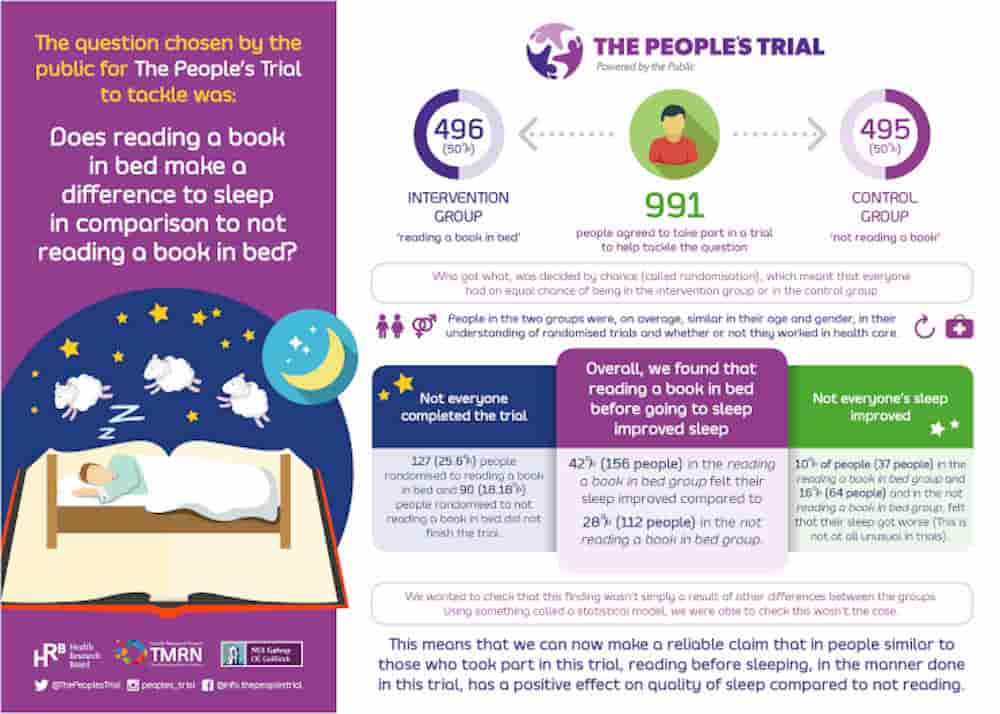Reading is a favourite pastime for many, offering a chance to escape into imaginative worlds, learn about new subjects, or simply unwind after a long day.
However, a common experience for many readers is the sleepiness that seems to come with picking up a book. This phenomenon may leave some wondering why reading a novel makes them sleepy, even when they are genuinely interested in it.
Why Reading Makes You Sleepy – A Biological Explanation
It is common to read a book before going to bed at the end of the day. However, reading a book at night and staying awake can start to feel difficult if you’ve had a lot to deal with during the day. And reading in low light can be harder on the eyes, requiring them to work harder to make out the letters.
One reason is that reading involves your eye muscles‘ continuous movement and focus. As you read, these muscles help you make sense of the information on the page, requiring effort and concentration.
Prolonged use of the eye muscles can lead to eye fatigue and strain, causing your eyes to feel tired. This sensation of tiredness may eventually signal your brain that it’s time to rest, making you feel sleepy. This effect is enhanced when you read a book while lying comfortably curled up in bed or a comfy chair.
In addition, the repetitive and predictable pattern of reading often means less cognitive stimulation for your brain, which can contribute to feelings of drowsiness. And when you’re physically still, your brain may interpret this lack of activity as a signal to wind down and fall asleep.
The Effect of Melatonin and Circadian Rhythm
The hormone melatonin is crucial in regulating your sleep and wake cycles. It is naturally produced by your body and released as the day turns into night, signalling to the brain that it’s time to feel sleepy.
Exposure to bright light, especially the blue light emitted by electronic devices, can disrupt melatonin production and delay feelings of sleepiness. However, when you read something printed on physical paper, such as a book, there is typically less exposure to artificial blue light. This makes reading physical books more conducive to the production and release of melatonin.
Moreover, your circadian rhythm, the internal clock that controls your sleep and wakefulness, is sensitive to environmental cues like light exposure and activities. Since reading is often a quiet, low-energy activity done in dimmer lighting conditions, it can help signal your circadian rhythm that it’s time to sleep.
Sleep Quality
The good news is that reading a book in bed before going to sleep seems to improve sleep quality. In a 2021 online randomized trial, 991 people aged 18 years or over in Ireland were divided into a research group (reading a book in bed before sleep) and a control group (not reading a book).
After completing the seven-day trial, people rated their overall sleep quality on a scale of 0 to 10. Participants also rated themselves on sleep disturbance and daytime sleepiness.
At the conclusion of the trial, the researchers analyzed the results. They found that those in the reading group tended to have better overall sleep quality and had lower sleep disturbance, on average, than those not reading a book in bed.
Brain Regions Involved in Reading
One study published in 2013 investigated the correlation between reading ability and brain structure revealed by high-resolution magnetic resonance imaging (MRI) scans of more than 200 participants.
All of the participants were college students, roughly the same age, had roughly the same level of education, were right-handed (lefties use the opposite hemisphere of their brain for reading), and had roughly the same language proficiency, to control for outside influences (Chinese-speaking, with English as a second language for more than nine years). They also had their IQ, reaction time, and memory tested.
These tests were designed to examine three aspects of reading: the ability to decode printed words, the accuracy with which participants could associate a new word with its sound, and the speed at which participants could read aloud.
It was discovered that each of these factors was connected to the volume of gray matter — or the number of neurons — in various regions of the brain.
The MRI analysis revealed that phonological decoding ability was strongly associated with gray matter volume in the left superior parietal lobe (around the top/rear of the brain); form-sound association was strongly associated with the hippocampus and cerebellum; and naming speed activated a number of brain regions.
The findings strongly suggest that reading is comprised of distinct abilities and is supported by distinct neural systems that are relatively independent of general cognitive abilities.
External Factors Contributing to Sleepiness
Lighting plays a significant role in making an individual feel sleepy while reading. Good lighting is essential for maintaining concentration and alertness.
In contrast, poor lighting conditions can lead to eye strain, discomfort, and fatigue, eventually causing sleepiness. Ensuring the reading environment is well-lit is important to minimize the chances of getting tired.
Temperature can also affect sleepiness when reading. A room with a comfortable temperature helps maintain an alert state.
Too hot or cold ambient temperatures can create discomfort, making it easy to get sleepy and difficult to focus on reading. Maintaining a moderate room temperature when reading is recommended to balance comfort and alertness.
Role of Comfortable Position
Selecting a comfortable reading position can greatly influence the overall reading experience. Try reading in a supportive and relaxed posture – it can prevent physical discomfort and maintain concentration.
However, a too-comfortable position can induce drowsiness and cause the reader to fall asleep.
Choosing a reading position that promotes alertness and reduces fatigue while providing enough support to the body is crucial. A chair with proper back support or a cushioned surface with a slight incline can help achieve a comfortable yet alert reading position.
Psychological Aspects of Reading and Sleepiness
The requirement for intense focus and sustained attention while reading can take a toll on wakefulness. Maintaining such a high concentration level can be mentally exhausting, leading to a decrease in alertness and, eventually, drowsiness.
The mental imagery and imagination evoked by reading can sometimes resemble daydreaming, further inducing a sense of tranquillity and a propensity for falling asleep.
Writing is only about 5,500 years old, unlike human speech, which is thought to have developed 50,000 to 2 million years ago, so our brains are much less adapted to writing and reading. There are many cognitive processes involved in reading, and in cognitive science, the study of reading is probably the most successful area.
Psychologist Hollis Scarborough, who does research into how we learn to read, particularly early language development and its connection to later literacy, published in 2001 the Reading Rope infographic, which used strands of rope woven together to show the multiple components that are involved in becoming a skilled reader.
The components include an upper strand representing language comprehension skills working together comprising
+ Background knowledge (facts, concepts, etc.)
+ Vocabulary (breadth, precision, links, etc.)
+ Language structures (syntax, semantics, etc.)
+ Verbal reasoning (inference, metaphor, etc.)
+ Literacy knowledge (print concepts, genres, etc.)
and a lower strand representing word recognition skills which reinforce one another comprising
+ Phonological awareness (syllable, phonemes, etc.)
+ Decoding (alphabetic principle, spelling-sound correspondence)
+ Sight recognition (of familiar words)
More recent work from Scarborough and Laurie E. Cutting points out the importance of executive function processes (working memory, planning, organization, self-monitoring, and similar abilities) to reading comprehension.
Reading Material
The content of the material being read can play a significant role in determining the reader’s level of engagement and interest. For instance, a text deemed boring or unstimulating may quickly lead to feelings of boredom, daydreaming, and yawning, increasing the probability of falling asleep.
A text dense with information, such as a textbook or technical paper stuffed with jargon, can increase the processing demands placed on the brain and have the same result.
On the other hand, anxiety and other emotional responses can also impact the relationship between reading and sleepiness. A gripping or emotionally charged story may heighten anxieties, making it difficult for the reader to focus or relax. In such cases, the heightened emotional state may counteract feelings of drowsiness, leading to increased alertness and wakefulness.
Reading Habits
One reason reading might make a person sleepy is the lack of physical activity. Reading typically requires a person to sit or lie down for an extended period, which can lead to feelings of rest and relaxation. This sedentary posture might cause an individual to become tired and eventually doze off gradually.
Another factor contributing to sleepiness while reading could be the level of interest in the material. If a reader finds a book or article unengaging or monotonous, their mind may start to wander, resulting in decreased concentration and an increased likelihood of falling asleep. In contrast, an intriguing read may help the reader stay alert and focused.
Individuals might consider taking breaks and incorporating physical activity into their routines to combat sleepiness and stay alert while reading.
Moving around can help increase heart rate, reduce feelings of drowsiness, and improve concentration. Alternatively, readers may listen to an audiobook or read aloud, keeping them more engaged and reducing eye strain.
Additionally, individuals should ensure they get enough sleep to minimize feelings of fatigue during the day. A lack of sleep can exacerbate sleepiness during activities like reading and may even signal an underlying sleep disorder.
These various factors – lack of physical activity, interest in the material, and eye strain – can contribute to sleepiness while reading. To stay alert and maintain concentration, individuals can incorporate movement, listen to audiobooks, and ensure they get sufficient rest.
Tip to Avoid Sleepiness While Reading
A few strategies can help avoid drowsiness and improve focus during reading sessions.
- Taking breaks is essential when reading for extended periods. Readers can set a timer, like every 30 minutes or an hour, to temporarily step away from their material and engage in another activity. This can help maintain concentration and avoid mental fatigue.
- Choosing the proper time to read is important. Avoid engaging in long reading sessions close to bedtime, as the mind naturally tends to wind down, and sleepiness can be challenging to overcome. Instead, schedule reading periods during the daytime when alertness levels are higher.
- Temperature plays a significant role in maintaining focus. If feeling sleepy while reading, splashing some cold water on one’s face or drinking a glass of cold water can help stimulate alertness. Adjusting the room temperature to a cooler setting can further prevent drowsiness.
- Managing stress is essential for maintaining concentration during reading sessions. Practicing relaxation techniques such as deep breathing, meditation, or taking short walks during breaks can help reduce stress levels, resulting in a more focused and alert mindset.
Incorporating these strategies into reading sessions can greatly enhance focus and prevent sleepiness, allowing for more effective and enjoyable reading experiences.
Frequently Asked Questions
Why do I get drowsy while studying?
Getting drowsy while studying is a common issue faced by many individuals. One of the reasons is the mental effort needed to concentrate on the material, which could lead to cognitive fatigue.
Factors like poor sleep, an uncomfortable reading environment, or lack of interest in the subject matter can also contribute to sleepiness while studying.
What causes sleepiness during reading or watching TV?
Sleepiness during reading or watching TV can occur due to physical fatigue, eye strain, and the relaxing effect of engaging in passive activities. In particular, staring at screens or books for an extended period can cause eye fatigue, which might result in drowsiness.
How can I avoid falling asleep while reading?
To avoid falling asleep while reading, consider implementing strategies like taking regular breaks, creating a comfortable reading environment with good lighting, and maintaining an upright posture.
Engaging in physical activity or consuming a light, energy-boosting snack before reading can also be helpful to increase your alertness.
Does reading cause yawning?
Yawning can be induced by reading as a result of factors such as boredom, eye strain, or a lack of oxygen in the brain. However, it is an involuntary physiological response and not directly caused by reading.
Is sleepiness related to the type of text being read?
Yes, the type of text being read can impact the level of sleepiness. For example, reading complex or monotonous texts might require more mental effort and thus cause cognitive fatigue, leading to drowsiness more quickly than engaging with interesting or stimulating content.
Can ADHD contribute to sleepiness while reading?
Attention Deficit Hyperactivity Disorder (ADHD) can contribute to sleepiness while reading. Individuals with ADHD might have difficulty sustaining attention, leading to boredom or cognitive overload. This can ultimately result in sleepiness or fatigue during tasks such as reading.
References:
- Cutting, L.E., & Scarborough, H.S. (2012). Multiple bases for comprehension difficulties: The potential of cognition and neurobiological profiling for validation of subtypes and development of assessments. In J.P. Sabatini, T. O’Reilly, & E.R. Albro (Eds.), Reaching an understanding: Innovations in how we view reading assessment. Lanham: Rowan & Littlefield Education.
- Dehaene, Stanislas (2010). Reading in the brain. Penguin Books. ISBN 978-0143118053
- Enrico Sella, Rocco Palumbo, Alberto Di Domenico & Erika Borella (2022) How emotions induced by reading influence sleep quality in young and older adults, Aging & Mental Health, DOI: 10.1080/13607863.2022.2138266
- Finucane, E., O’Brien, A., Treweek, S. et al. Does reading a book in bed make a difference to sleep in comparison to not reading a book in bed? The People’s Trial—an online, pragmatic, randomised trial. Trials 22, 873 (2021).
- Jacobson, L.A., Ryan, M., Martin, R.B., Ewen, J.B., Mostofsky, S.H., Denckla, M.B., & Mahone, E.M. (2011). Working memory influences processing speed and reading fluency in ADHD. Child Neuropsychology, 17, 209 – 224.
- Q. He, G. Xue, C. Chen, C. Chen, Z.-L. Lu, Q. Dong. Decoding the Neuroanatomical Basis of Reading Ability: A Multivoxel Morphometric Study. Journal of Neuroscience, 2013; 33 (31): 12835 DOI: 10.1523/JNEUROSCI.0449-13.2013
- Pévet, P., Bothorel, B., Slotten, H.A., & Saboureau, M. (2002). The chronobiotic properties of melatonin. Cell and Tissue Research, 309, 183-191.
- Schmandt-Besserat, D. (1986). The Origins of Writing. Written Communication, 3, 31 – 45.
- T Åkerstedt, M Gillberg, Subjective and objective sleepiness in the active individual. Int J Neurosci 52, 29–37 (1990).
Last Updated on September 19, 2023


